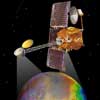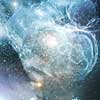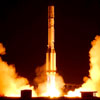|
Sunday:
November 30, 2003 | |
0249 GMT |
 |
Biggest star in our galaxy sits in ball-shaped cocoon
Ever since 1841, when the until then inconspicuous southern star Eta Carinae underwent a spectacular outburst, astronomers have wondered what exactly is going on in this unstable giant star.
 FULL STORY FULL STORY
 |  |

|
 |
|
Saturday:
November 29, 2003 | |
1600 GMT |
 |
Japanese launch fails
The second pair of Japanese spy satellites, destined for a reconnaissance mission to observe the activities of North Korea, was destroyed Saturday during a failed launch aboard the H-2A rocket. The vehicle didn't achieve the necessary speed for orbit, prompting controllers to send a destruct command to the rocket.
 FULL STORY - updated! FULL STORY - updated!
 |  |

|
 |
Sea recons readied
A National Reconnaissance Office secret space mission, important for tracking potential terrorist movements involving ships, is poised for liftoff from Vandenberg Air Force Base, California. The 13,700-pound payload of 2-3 ocean surveillance spacecraft is to be launched as early as about 2 a.m. local time Tuesday on board a U.S. Air Force/Lockheed Martin Atlas-Centaur.
 LAUNCH PREVIEW STORY LAUNCH PREVIEW STORY
 GROUND TRACK MAP GROUND TRACK MAP
 |  |

|
 |
|
Friday:
November 28, 2003 | |
0252 GMT |
 |
Atlas 2AS rocket poised for predawn liftoff Tuesday
Delivery of a top-secret reconnaissance payload into space by a Lockheed Martin Atlas rocket remains scheduled for early Tuesday from Vandenberg Air Force Base, California.
 MISSION STATUS CENTER MISSION STATUS CENTER
 |  |

|
 |
The last cry of matter
'Black holes' are truly black. When an object gets within a certain distance from a black hole, it will get swallowed forever with no chance to escape. That includes light, which means that black holes do not shine.
 FULL STORY FULL STORY
 |  |

|
 |
|
Thursday:
November 27, 2003 | |
0053 GMT |
 |
Radiation monitoring device fails on Mars spacecraft
The martian radiation environment experiment on NASA's 2001 Mars Odyssey orbiter stopped working last month during a period of intense solar activity, the space agency announced Wednesday.
 FULL STORY FULL STORY
 |  |

|
 |
Thanksgiving in space: Reflecting on difficult year
Expedition 8 commander Mike Foale and flight engineer Alexander Kaleri -- living aboard the International Space Station -- offer a Thanksgiving Day message and remember the fallen crew of Columbia. They will dine on packaged turkey and talk to their families on Thursday. The video is available to Spaceflight Now Plus subscribers.
 |  |

|
 |

Video coverage for subscribers only:
 VIDEO: THANKSGIVING DAY MESSAGE FROM SPACE STATION QT VIDEO: THANKSGIVING DAY MESSAGE FROM SPACE STATION QT
 MORE VIDEO! MORE VIDEO!
 SUBSCRIBE NOW SUBSCRIBE NOW

|
Solution for Kuiper belt mystery
A new study by researchers provides an explanation for one of the more mysterious aspects of the population of objects beyond Neptune. In doing so, it provides a unique glimpse into the proto-planetary disk from which the Solar System's planets formed.
 FULL STORY FULL STORY
 |  |

|
 |
|
Wednesday:
November 26, 2003 | |
0001 GMT |
 |
Cheap method developed for solar system hunt
Astronomers have invented an inexpensive method to determine if other solar systems like our own exist. Among the more than 100 stars now known to have planets, astronomers have found few systems similar to ours. It's unknown if this is because of technological limitations or if our system is truly a rare configuration.
 FULL STORY FULL STORY
 |  |

|
 |
Sea Launch set for three-launch opener in 2004
Sea Launch is currently preparing to launch the Telstar 14/Estrela do Sul 1 communications satellite for Space Systems/Loral in January. This mission will be the first of three Loral missions early next year.
 FULL STORY FULL STORY
 ESTRELA DO SUL 1 SHIPPED TO SEA LAUNCH ESTRELA DO SUL 1 SHIPPED TO SEA LAUNCH
 |  |

|
 |
Why constants of nature may be changing
Light signals from exceedingly bright and distant galaxies called quasars seem to indicate that the bond between electrons and protons was weaker in the early universe.
 FULL STORY FULL STORY
 |  |

|
 |
Key milestones achieved on next-generation engine
NASA, the U.S Air Force and two prime aerospace contractors have successfully completed testing of two key rocket engine components - critical milestones in the development of innovative engine systems that could, within decades, power a new generation of American space launch vehicles.
 FULL STORY FULL STORY
 |  |

|
 |
|
Tuesday:
November 25, 2003 | |
0203 GMT |
 |
Galactic winds blow away idea of 'island Universe'
It was the 17th Century English preacher and poet John Donne who wrote the immortal lines "No man is an island, entire of itself; every man is a piece of the continent, a part of the main." Today, astronomers have determined we also do not live in an "island Universe" - that is, a Universe in which the vast agglomerations of gas and stars known as galaxies are wholly independent of the influence of neighboring galaxies and their surrounding environment.
 FULL STORY FULL STORY
 |  |

|
 |
Proton rocket lifts off
A Russian Proton K rocket fitted with a Block DM upper stage launched from Baikonur Cosmodrome at 0622 GMT (1:22 a.m. EDT) Monday carrying a pair of domestic communications spacecraft. The Yamal 200-series satellites will provide services across Russia, Europe and Southeast Asia from geostationary orbit. This was the third Proton launch of 2003, with two more scheduled next month.
 |  |

|
 |
|
Monday:
November 24, 2003 | |
0001 GMT |
 |
NASA successfully tests futuristic ion engine
NASA's Project Prometheus recently reached an important milestone with the first successful test of an engine -- a High Power Electric Propulsion ion engine -- that could lead to revolutionary propulsion capabilities for space exploration missions throughout the solar system and beyond.
 FULL STORY FULL STORY
 |  |

|
 |
Pluto mission to study Jupiter en route
The main goal of NASA's New Horizons mission may be to explore Pluto-Charon and the Kuiper belt beginning in 2015, but first the mission plans to fly by the solar system's largest planet, Jupiter, in 2007. The Jupiter flyby would be used by New Horizons to provide a gravitational assist that shaves years off the trip time to Pluto-Charon and the Kuiper belt.
 FULL STORY FULL STORY
 |  |

|
 |
Space station's Expedition 9 crew named
Veteran NASA astronaut William S. McArthur Jr., a retired U.S. Army colonel, and Russian Air Force Colonel Valery I. Tokarev are the next crew for the International Space Station. They will launch to the station aboard a Russian Soyuz spacecraft in April for a six-month mission.
 FULL STORY FULL STORY
 |  |

|
 |

Video coverage for subscribers only:
 VIDEO: MCARTHUR TALKS ABOUT THE FUTURE QT VIDEO: MCARTHUR TALKS ABOUT THE FUTURE QT
 MORE VIDEO! MORE VIDEO!
 SUBSCRIBE NOW SUBSCRIBE NOW

|

